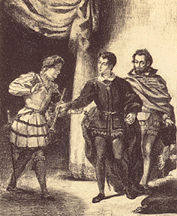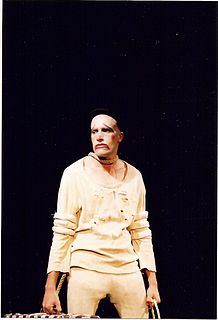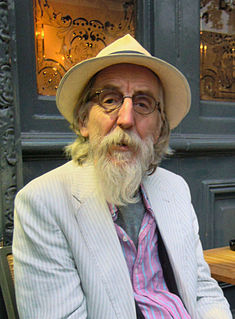
Waiting for Godot is a play by Samuel Beckett in which two characters, Vladimir (Didi) and Estragon (Gogo), engage in a variety of discussions and encounters while awaiting the titular Godot, who never arrives. Waiting for Godot is Beckett's translation of his own original French-language play, En attendant Godot, and is subtitled "a tragicomedy in two acts". The original French text was composed between 9 October 1948 and 29 January 1949. The premiere, directed by Roger Blin, was on 5 January 1953 at the Théâtre de Babylone, Paris. The English-language version premiered in London in 1955. In a poll conducted by the British Royal National Theatre in 1998/99, it was voted the "most significant English language play of the 20th century".
Act Without Words I is a short play by Samuel Beckett. It is a mime, Beckett's first. Like many of Beckett's works, the play was originally written in French, being translated into English by Beckett himself. It was written in 1956 following a request from the dancer Deryk Mendel and first performed on 3 April 1957 at the Royal Court Theatre in London. On that occasion it followed a performance of Endgame. The original music to accompany the performance was written by composer John S. Beckett, Samuel's cousin, who would later collaborate with him on the radio play Words and Music.

Absurdist fiction is a genre of novels, plays, poems, films, or other media that focuses on the experiences of characters in situations where they cannot find any inherent purpose in life, most often represented by ultimately meaningless actions and events that call into question the certainty of existential concepts such as truth or value.

Longshot is a fictional superhero appearing in American comic books published by Marvel Comics, most commonly in association with the X-Men. Created by writer Ann Nocenti and artist Art Adams, he first appeared in Longshot #1, the first issue of a six-issue miniseries that represents the first major work of both Nocenti and Adams. The Longshot series established Longshot as an amnesiac fugitive from another dimension who discovers that he has favorable probability outcomes, or "good luck," that protect him when his motives are pure, and that he was a paradoxical genetically engineered clone of his future son, raised to be a slave who led a rebellion on his dystopian world against his former master and enemy, Mojo.
Rough for Theatre II is a short play by Samuel Beckett. "Although this discarded piece of theatre is dated 'circa 1960' in End and Odds, a manuscript from two years earlier exists in Trinity College, Dublin, Library. This situates a first version, written in French [as Fragment de théâtre II] and different from that eventually published in 1976 as between the English plays Krapp's Last Tape and Embers." It is rarely produced.

Irving Lahrheim, known professionally as Bert Lahr, was an American actor, comedian and vaudevillian. He was best known for his role as the Cowardly Lion, as well as his counterpart Kansas farmworker "Zeke", in the MGM adaptation of The Wizard of Oz (1939). He was well known for his quick-witted humor and his work in burlesque and vaudeville and on Broadway.
Matthew Kelly is an English actor and presenter. Having been trained as a theatre actor, he first came to public prominence as a television presenter of ITV light entertainment shows such as Game for a Laugh, You Bet! and Stars in Their Eyes. In the 2000s he returned to acting, appearing in several West End productions, while also acting in some television roles.
Beckett on Film was a project aimed at making film versions of all nineteen of Samuel Beckett's stage plays, with the exception of the early and unperformed Eleutheria. This endeavour was successfully completed, with the first films being shown in 2001.
Estragon is one of the two main characters from Samuel Beckett's Waiting for Godot. His name is the French word for tarragon.
Vladimir is one of the two main characters from Samuel Beckett's Waiting for Godot.

Peter Woodthorpe was an English actor who supplied the voice of Gollum in the 1978 Bakshi version of The Lord of the Rings and BBC's 1981 radio serial. He also provided the voice of Pigsy in the cult series Monkey and was Max the pathologist in early episodes of Inspector Morse.

Rosencrantz and Guildenstern are characters in William Shakespeare's tragedy Hamlet. They are childhood friends of Hamlet, summoned by King Claudius to distract the prince from his apparent madness and if possible to ascertain the cause of it. The characters were revived in W. S. Gilbert's satire, Rosencrantz and Guildenstern, and as the alienated heroes of Tom Stoppard's absurdist play, Rosencrantz and Guildenstern Are Dead, which was adapted into a film.

Lucky is a character from Samuel Beckett's Waiting for Godot. He is a slave to the character Pozzo.
Act Without Words II is a short mime play by Samuel Beckett, his second. Like many of Beckett's works, the piece was originally composed in French, then translated into English by Beckett himself. Written in the late 1950s it opened at the Clarendon Press Institute in Oxford and was directed by John McGrath. London premiere was directed by Michael Horovitz and performed at the Institute of Contemporary Arts, on 25 January 1960. The first printing was in New Departures 1, Summer 1959.
Ronald Alfred Pickup was an English actor. He was active in television, film, and theatre, beginning with a 1964 appearance in Doctor Who. Theatre critic Michael Billington described him as "a terrific stage star and an essential member of Laurence Olivier's National Theatre company". His major screen roles included Prince Yakimov in Fortunes of War (1987) and Norman in The Best Exotic Marigold Hotel (2012).
In the creation and criticism of fictional works, a character flaw or heroic flaw is a bias, limitation, imperfection, problem, personality disorder, vice, phobia, prejudice, or deficiency present in a character who may be otherwise very functional. The flaw can be a problem that directly affects the character's actions and abilities, such as a violent temper. Alternatively, it can be a simple foible or personality defect, which affects the character's motives and social interactions, but little else.
Le Gros et le maigre is a short silent, comic film written and directed by Roman Polanski in 1961. Polanski shot this short film just after graduating from The National Film School in Łódź in 1959; it was made in France and was Polanski's last film before the international breakthrough of his 1962 debut feature, Knife in the Water. The Fat and the Lean features the music of Krzysztof Komeda, who composed the scores for all but one of the director's films between Two Men and a Wardrobe (1958) and Rosemary's Baby (1968).

Robert Goody is a British actor, librettist, writer and former member of the Royal Shakespeare Company.
While Waiting for Godot is a web series adaptation of Samuel Beckett’s play En Attendant Godot. It is the winner of Best Cinematography at the 2014 Rome Web Awards, and an Official Selection of the 2014 Miami Web Fest.
Minoru Betsuyaku was one of Japan's most prominent postwar playwrights, novelists, and essayists, associated with the Angura ("underground") theater movement in Japan. He won a name for himself as a writer in the "nonsense" genre and helped lay the foundations of the Japanese "theater of the absurd." His works focused a lot on the aftermath of the war and especially the nuclear holocaust.







